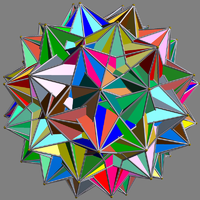
Great dirhombicosidodecahedron
Encyclopedia
In geometry
, the great dirhombicosidodecahedron is a nonconvex uniform polyhedron
, indexed last as U75.
This is the only uniform polyhedron with more than six faces meeting at a vertex. Each vertex has 4 squares which pass through the vertex central axis (and thus through the centre of the figure), alternating with two triangles and two pentagrams.
This is also the only uniform polyhedron that cannot be made by Wythoff construction
. It has a special Wythoff symbol
| 3/2 5/3 3 5/2.
It has been nicknamed "Miller's monster" (after J. C. P. Miller
, who with H. S. M. Coxeter and M. S. Longuet-Higgins enumerated the uniform polyhedra in 1954).
which has the same vertices and edges but with a different arrangement of triangular faces.
The vertices and edges are also shared with the uniform compounds of 20 octahedra
or 20 tetrahemihexahedra
. 180 of the 240 edges are shared with the great snub dodecicosidodecahedron
.
where τ = (1+√5)/2 is the golden ratio
(sometimes written φ). These vertices result in an edge length of 2√2.
Geometry
Geometry arose as the field of knowledge dealing with spatial relationships. Geometry was one of the two fields of pre-modern mathematics, the other being the study of numbers ....
, the great dirhombicosidodecahedron is a nonconvex uniform polyhedron
Nonconvex uniform polyhedron
In geometry, a uniform star polyhedron is a self-intersecting uniform polyhedron. They are also sometimes called nonconvex polyhedra to imply self-intersecting...
, indexed last as U75.
This is the only uniform polyhedron with more than six faces meeting at a vertex. Each vertex has 4 squares which pass through the vertex central axis (and thus through the centre of the figure), alternating with two triangles and two pentagrams.
This is also the only uniform polyhedron that cannot be made by Wythoff construction
Wythoff construction
In geometry, a Wythoff construction, named after mathematician Willem Abraham Wythoff, is a method for constructing a uniform polyhedron or plane tiling. It is often referred to as Wythoff's kaleidoscopic construction.- Construction process :...
. It has a special Wythoff symbol
Wythoff symbol
In geometry, the Wythoff symbol was first used by Coxeter, Longeut-Higgens and Miller in their enumeration of the uniform polyhedra. It represents a construction by way of Wythoff's construction applied to Schwarz triangles....
| 3/2 5/3 3 5/2.
It has been nicknamed "Miller's monster" (after J. C. P. Miller
J. C. P. Miller
Jeffrey Charles Percy Miller was an English mathematician and computing pioneer. He worked in number theory and on geometry, particularly polyhedra, where Miller's monster refers to the great dirhombicosidodecahedron....
, who with H. S. M. Coxeter and M. S. Longuet-Higgins enumerated the uniform polyhedra in 1954).
Related polyhedra
If the definition of a uniform polyhedron is relaxed to allow any even number of faces adjacent to an edge, then this definition gives rise to one further polyhedron: the great disnub dirhombidodecahedronGreat disnub dirhombidodecahedron
In geometry, the great disnub dirhombidodecahedron, also called Skilling's figure, is a uniform star polyhedron.John Skilling discovered this one further uniform polyhedron, by relaxing the condition that only two faces may meet at an edge...
which has the same vertices and edges but with a different arrangement of triangular faces.
The vertices and edges are also shared with the uniform compounds of 20 octahedra
Compound of twenty octahedra
This uniform polyhedron compound is a symmetric arrangement of 20 octahedra . It is a special case of the compound of 20 octahedra with rotational freedom, in which pairs of octahedral vertices coincide.- Related polyhedra :...
or 20 tetrahemihexahedra
Compound of twenty tetrahemihexahedra
This uniform polyhedron compound is a symmetric arrangement of 20 tetrahemihexahedra. It is chiral with icosahedral symmetry .John Skilling notes, in his enumeration of uniform compounds of uniform polyhedra, that this compound of 20 tetrahemihexahedra is unique in that it cannot be obtained by...
. 180 of the 240 edges are shared with the great snub dodecicosidodecahedron
Great snub dodecicosidodecahedron
In geometry, the great snub dodecicosidodecahedron is a nonconvex uniform polyhedron, indexed as U64.- Related polyhedra :It shares its vertices and edges, as well as 20 of its triangular faces and all its pentagrammic faces, with the great dirhombicosidodecahedron,...
.
 Convex hull Convex hull In mathematics, the convex hull or convex envelope for a set of points X in a real vector space V is the minimal convex set containing X.... |
 Great snub dodecicosidodecahedron Great snub dodecicosidodecahedron In geometry, the great snub dodecicosidodecahedron is a nonconvex uniform polyhedron, indexed as U64.- Related polyhedra :It shares its vertices and edges, as well as 20 of its triangular faces and all its pentagrammic faces, with the great dirhombicosidodecahedron,... |
 Great dirhombicosidodecahedron |
 Great disnub dirhombidodecahedron Great disnub dirhombidodecahedron In geometry, the great disnub dirhombidodecahedron, also called Skilling's figure, is a uniform star polyhedron.John Skilling discovered this one further uniform polyhedron, by relaxing the condition that only two faces may meet at an edge... |
 Compound of twenty octahedra Compound of twenty octahedra This uniform polyhedron compound is a symmetric arrangement of 20 octahedra . It is a special case of the compound of 20 octahedra with rotational freedom, in which pairs of octahedral vertices coincide.- Related polyhedra :... |
 Compound of twenty tetrahemihexahedra Compound of twenty tetrahemihexahedra This uniform polyhedron compound is a symmetric arrangement of 20 tetrahemihexahedra. It is chiral with icosahedral symmetry .John Skilling notes, in his enumeration of uniform compounds of uniform polyhedra, that this compound of 20 tetrahemihexahedra is unique in that it cannot be obtained by... |
Cartesian coordinates
Cartesian coordinates for the vertices of a great dirhombicosidodecahedron are all the even permutations of- (0, ±2/τ, ±2/√τ)
- (±(−1+1/√τ3), ±(1/τ2−1/√τ), ±(1/τ+√τ))
- (±(−1/τ+√τ), ±(−1−1/√τ3, ±(1/τ2+1/√τ))
where τ = (1+√5)/2 is the golden ratio
Golden ratio
In mathematics and the arts, two quantities are in the golden ratio if the ratio of the sum of the quantities to the larger quantity is equal to the ratio of the larger quantity to the smaller one. The golden ratio is an irrational mathematical constant, approximately 1.61803398874989...
(sometimes written φ). These vertices result in an edge length of 2√2.
External links
- http://www.mathconsult.ch/showroom/unipoly/75.html
- http://www.software3d.com/MillersMonster.php

